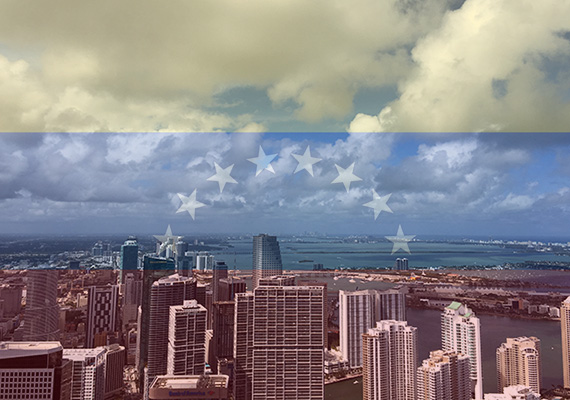
Miami and the Venezuelan flag
President Trump extended his controversial travel ban to include Venezuela, causing momentary panic among Venezuelan investors of Miami real estate.
The order, which bans most citizens from Iran, Libya, Syria, Yemen, Somalia, Chad and North Korea, only bans some Venezuelan government officials and their families from entering the United States effective Oct. 18, according to the White House.
For Venezuelan-born EB-5 developer Rodrigo Azpurua, the news was “concerning.” Azpurua, CEO of commercial real estate firm Riviera Point Development Group, said about 70 percent of his EB-5 investors are Venezuelan. His office received a handful of calls from worried investors, and is working on sending out a blog post explaining the White House’s ban.
The real estate industry has been largely silent when it comes to commenting on the president’s initial ban on citizens of seven Muslim-majority nations.
But a ban on Venezuelans entering the U.S. would be detrimental to the real estate market, said Peter Zalewski, a real estate consultant and founder of Condo Vultures and CraneSpotters.In 2015 and 2016, Venezuelan home buyers purchased the most homes in South Florida out of all foreign countries, according to the Miami Association of Realtors. Venezuelan buyers spent $868 million of the $6.2 billion foreign investors spent on residential properties in South Florida last year.
Cities like Doral and Weston have earned the nicknames of “Doralzuela” and “Westonzuela” for their large communities of Venezuelan families. Blocking Venezuelans from entering the U.S. “could change Miami’s real estate foundation for quite some time,” Zalewski added.
The political chaos and social unrest in Venezuela has led some of its wealthier citizens to not only continue investing in South Florida condos and homes, but also commercial real estate and other businesses. If they were cut off from Miami, the so-called capital of Latin America, Zalewski expects Venezuelans would up their investing in Panama City, Panama, a “cheaper” version of Miami.
“You can walk down the main strip of Panama City and walk down Brickell Avenue and I would challenge you to find the difference.”
